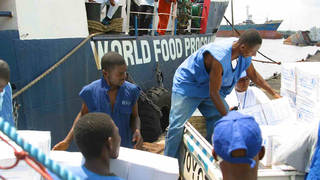
Related
By Amy Goodman and Denis Moynihan
The MS St. Louis was a German passenger ship whose most famous voyage, in the spring of 1939, became known as “The Voyage of the Damned.” On that trip, 908 German Jewish refugees were headed to Cuba, fleeing the Nazis, but only 22 of the Jewish passengers were allowed to disembark. Aid organizations pleaded with U.S. President Franklin D. Roosevelt and the government of Canada to accept the refugees. They were snubbed, and the vessel headed back to Europe. Hundreds of the repatriated refugees would die in the Holocaust. The refusal of the U.S. government to accept them remains a dark stain on our history. Sadly, our government’s current track record with refugee resettlement suggests that history may be repeating itself.
The sheer number of people suffering forced displacement today is staggering — the greatest flow of refugees since World War II. According to the United Nations High Commissioner for Refugees, 65.3 million people are forcibly displaced worldwide. Of those, 21.3 million are designated as refugees, and almost half of those people hail from just three countries: Somalia, Afghanistan and Syria. Five million have fled Syria alone, and more than 6 million are internally displaced there. Estimates put the death toll in Syria’s five-year civil war at more than 400,000. The destructive war in Yemen, meanwhile, has forced more than 3 million to flee their homes. The UNHCR predicts that 2016 will be the deadliest year for migrants attempting to cross the Mediterranean Sea. Another key statistic from Oxfam: “The six wealthiest countries [the U.S., China, Japan, Germany, France and the United Kingdom] — which make up more than half the global economy — host less than 9 percent of the world’s refugees while poorer countries and territories are shouldering most of the responsibility.”
It is in this context that the United Nations convened its first-ever high-level meeting on refugees this week, at its annual General Assembly in New York City. President Barack Obama followed that with a separate summit on the same issue. Before that could start, though, news surfaced that a desperately needed aid convoy bound for war-torn Aleppo, Syria, was hit by an airstrike, which the U.S. blamed on Russia, and Russia denied. Earlier, on Saturday, a fragile cease-fire collapsed when the U.S. struck and killed Syrian national armed forces, which the Pentagon labeled a “mistake.”
To the shock of many, the U.S. played a spoiler role at the U.N., successfully stripping language from the nonbinding statement that would have expressly forbid the detention of refugee children. Instead, it now reads that children will be imprisoned “only as a measure of last resort … for the shortest possible period of time.” Tell that to 16-year-old Estefany Adriana Mendez, who has been held at the Berks County Residential Center — an immigrant family jail in Pennsylvania. Through a translator, the native El Salvadoran told the “Democracy Now!” news hour, “The truth for all of us here, the children who are here, and the mothers: This is a horrible experience to be in detention, because more than a year of incarceration for a child is not just.”
As the U.N refugee summit was underway, Donald Trump’s son, Donald Jr., tweeted, “If I had a bowl of Skittles and I told you just three would kill you. Would you take a handful? That’s our Syrian refugee problem.” Skittles’ parent company, Wrigley, responded, “Skittles are candy. Refugees are people. We don’t feel it’s an appropriate analogy.”
The plight of refugees is no joke to Manfred Lindenbaum, who attended the U.N. summit as an observer. A spry octogenarian, he was a refugee himself at the age of 6. Like those on the voyage of the damned, he was a German Jew. In 1939, he and his brother fled from Poland to England on the famous Kindertransport, just days before the Nazis invaded. “The United States at that point said that we’re not taking in any Jewish children.” he recalled on “Democracy Now!” “At the last minute, as the German army was coming over, a few hundred of us got onto a Polish warship to England. And they wouldn’t let my sister on. She was 14. So she was murdered with the rest of my family.”
The philosopher George Santayana wrote, more than 100 years ago, “Those who cannot remember the past are condemned to repeat it.” From the Trumps’ hateful rhetoric to Obama’s pernicious refugee policies, the lives of millions hang in the balance. Let’s hope that reason and compassion prevail over xenophobia and hate.











Media Options